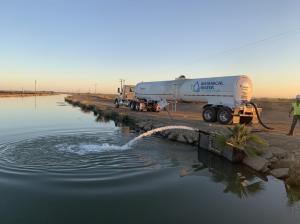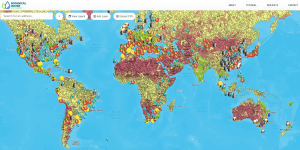Harvesting Change: The Impact of Hyperlocal Water Stewardship
Hyperlocal water stewardship empowers communities, fosters impactful partnerships, and provides corporations with access to invest in sustainable solutions.
What does Hyperlocal mean in the context of freshwater?
James Rees, Chief Impact Officer of BWT explains "in the context of freshwater resources, hyperlocal refers to focusing on making a positive and immediate impact within the specific area where a freshwater issue arises." It entails reintroducing water within the same basin from which withdrawals took place, thereby replenishing the local ecosystem. Additionally, hyperlocal efforts involve supplying clean drinking water to communities that have been adversely affected by industrial processes, which have caused water depletion or contamination, thereby restoring their access to safe and pure drinking water.
Botanical Water Technologies (BWT): Providing Corporates Access to Sustainable Water Impact Projects
To further enhance the impact of hyperlocal ground water replenishment and WASH initiatives, collaborations between organizations like BWT and corporate entities as well as governments can play a crucial role. BWT offers a deep technology solution that can create up to 3 trillion liters of a new sustainable source of drinking water harvested from plants. This is called “Botanical Water”. BWT’s goal is to positively impact 100 million of the world’s most vulnerable people by 2025.
BWT specializes in innovative solutions for water purification through their globally patented Water Harvesting Units (WHUs) and has the unique opportunity to partner with sugar mills, fruit & vegetable concentrate facilities, and even alcohol distilleries. These partnerships involve capturing the evaporative condensate, a by-product from these industries, and purifying it into clean drinking water for hyperlocal communities in need. Their standard WHU can produce close to 500,000 litres of drinking water per day. Every single drop of water is tracked from processor to end consumer through their globally award winning Botanical Water Exchange (BWX) co-created with Fujitsu.
BWT can provide a hyperlocal solution by matching processor locations with communities through certified WASH or environmental projects via their Sustainable Water Impact Maps (SWIM). SWIM is an interactive global mapping software which helps users identify new water sources and potential end uses. SWIM provides the flexibility and simplicity for corporates to explore and analyse global water basins with various mapping tools to assist with their water stewardship and ESG reporting.
By leveraging their technical expertise, BWT can transform this otherwise wasted resource into a sustainable and locally available source of safe drinking water. BWT collaborates with local NGOs and communities and provide corporates an opportunity to access replenishment and WASH programs in the locations where they operate, giving back to the communities while achieving their water stewardship goals.
By working together, BWT and corporates bring together technical expertise, resources, and financial support, addressing challenges in implementing hyperlocal groundwater replenishment and WASH initiatives. The technical know-how ensures the purification process meets the highest standards, delivering safe and clean drinking water to communities. Meanwhile, the financial and material support bridges gaps in funding and resources, making these initiatives more sustainable and scalable.
BWT Case Studies
• Tomato Processor Project - California, USA: Despite the presence of rain and snow in California, the state is facing a severe and persistent groundwater crisis, resulting in an increasing number of families relying on state-funded water deliveries. This crisis encompasses more than just dried-up wells and includes water systems that draw from contaminated groundwater containing hazardous pollutants such as nitrate and arsenic. The State Water Resources Control Board has identified 389 failing public water systems and 513 systems at risk, while approximately 81,000 domestic wells are also in danger of failing or experiencing water-quality issues. In response, Self-Help Enterprises has initiated a water program in the San Joaquin Valley, ensuring that 1,800 households receive clean drinking water. Additionally, BWT, in partnership with Ingomar Packing Company, the second-largest tomato processor in America, has devised an innovative solution to provide millions of gallons of clean drinking water to Californian’s (via Self-Help Enterprises) that was harvested from tomatoes. This approach ensures secure and reliable access to clean drinking water without requiring further treatment or filtration. The strategic location of the processors near communities reduces transportation costs and enables scalability throughout California. Overall, this project stands as a hyperlocal, cost-effective, sustainable, and a highly impactful solution when compared to existing water sources.
• Sugar Mill Project - Maharashtra, India: India is currently facing a severe water crisis marked by scarcity, pollution, and inadequate access to clean drinking water. With approximately 18% of the world's population but only 4% of the global freshwater supply, India confronts challenges such as depleting groundwater levels, water pollution from industrial and agricultural sources, and unequal distribution, exacerbating the crisis's impact on communities nationwide. To address this issue, BWT has partnered with one of Maharashtra's largest sugar mills to generate clean drinking water from the evaporative condensate produced during the sugar cane processing into sugar. BWT’s patented technology has the potential to provide potable drinking water to hyperlocal villages in need through ground water replenishment and WASH programs, and with over 500 sugar mills in India, it holds the possibility of extending clean water access to millions of people throughout the country all year round.
Final Thoughts
Hyperlocal approaches prioritise community involvement, utilising local resources and collaborations to address groundwater replenishment and WASH needs effectively and sustainably. Partnerships with organisations like BWT help provide safe water, fulfill stewardship goals, and make a sustainable impact. By investing in hyperlocal water stewardship initiatives, corporates and governments support global sustainability and empower positive change. Let's embrace hyperlocality to help communities thrive.
Botanical Water Technologies PR Team
Botanical Water Technologies
email us here
Visit us on social media:
Facebook
Twitter
LinkedIn
Instagram
YouTube
Botanical Water Technologies (BWT) - Positively Impacting People and the Planet
Legal Disclaimer:
EIN Presswire provides this news content "as is" without warranty of any kind. We do not accept any responsibility or liability for the accuracy, content, images, videos, licenses, completeness, legality, or reliability of the information contained in this article. If you have any complaints or copyright issues related to this article, kindly contact the author above.


